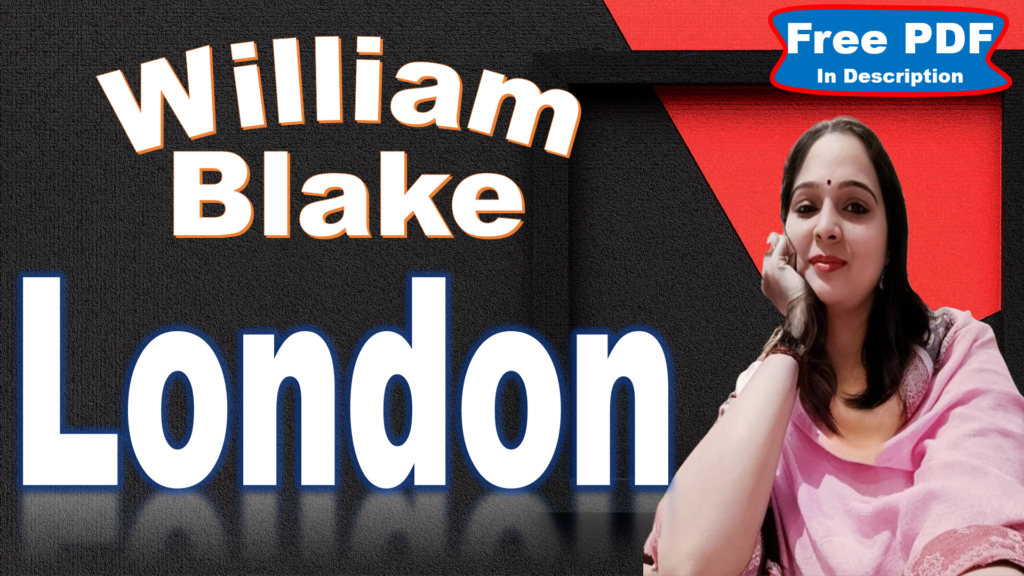
London by William Blake Questions and Answers
Very Short Answer Questions
What does “charter’d” mean in the poem?
Answer: It means controlled or restricted.
What does “mind-forg’d manacles” mean?
Answer: Mental chains or constraints.
What is the context of the poem?
Answer: The suffering in urban London during the Industrial Revolution.
What is the tone of the poem?
Answer: Somber and critical.
What does “marriage hearse” symbolize?
Answer: The decay of love and societal norms.
What do “Marks of weakness, marks of woe” signify?
Answer: The visible signs of suffering.
Why is “London” considered a Romantic poem?
Answer: It critiques societal issues and emphasizes emotion.
How does Blake depict power in “London”?
Answer: Through oppressive institutions and suffering.
What does “Runs in blood down Palace walls” mean?
Answer: Soldiers’ suffering stains the grandeur of authority.
What aspects of Romantic literature are evident in “London”?
Answer: Emotion, critique of society, and vivid imagery.
What is the meaning of “blackening” in the poem?
Answer: Symbolizes moral corruption.
Why is “every” repeated throughout the poem?
Answer: Emphasizes universality and suffering.
How does Blake depict suffering in “London”?
Answer: Through cries, curses, and tears.
What is the structure of “London”?
Answer: Four quatrains (ABAB rhyme).
How are people portrayed in Blake’s “London”?
Answer: As victims of societal constraints.
Why doesn’t Blake mention “London” directly?
Answer: The poem’s themes apply universally.
Does “London” have enduring applications?
Answer: Yes, it critiques oppression across time.
How does the poem express anger?
Answer: Through powerful imagery and critique.
What human truth does “London” present?
Answer: The cost of societal decay.
What type of poem is “London”?
Answer: A lyric poem with social commentary.
Short Answer Questions
What does “charter’d” mean in the poem?
Answer: In the poem “London,” the term “charter’d” refers to the controlled and regulated nature of the city streets. It suggests that the city’s spaces are not free but rather constrained by authority and rules.
What does “mind-forg’d manacles” mean?
Answer: “Mind-forg’d manacles” is a powerful metaphor in the poem. It represents mental constraints or psychological imprisonment. Blake implies that societal norms and oppressive systems create invisible chains that bind people’s minds.
What is the tone of the poem “London”?
Answer: The tone of “London” is somber and critical. Blake paints a bleak picture of the city, emphasizing suffering, corruption, and decay. The repetitive cries of distress contribute to the overall melancholic tone.
What does “marriage hearse” symbolize?
Answer: The phrase “marriage hearse” is paradoxical and symbolic. It represents the decay of love and hope within marriage. Blake suggests that societal norms and oppressive institutions taint even the most sacred aspects of life.
Why is “London” considered a Romantic poem?
Answer: “London” is a Romantic poem because it critiques societal issues, emphasizes emotion, and focuses on individual experience. Blake’s vivid imagery and concern for human suffering align with Romantic ideals.
What is the structure of William Blake’s “London”?
Answer: The poem consists of four quatrains (four-line stanzas), each with an ABAB rhyme scheme. This regular structure enhances the poem’s rhythmic flow and impact.
How does Blake depict suffering in “London”?
Answer: Blake portrays suffering through visual and auditory imagery. The cries of chimney-sweepers, soldiers, and harlots, along with the blood running down palace walls, evoke a sense of collective pain and despair.
Why doesn’t Blake mention “London” directly in his poem?
Answer: Blake’s omission of the word “London” allows the poem to transcend its specific setting. The themes of suffering, corruption, and societal decay apply universally, making it relevant beyond any particular city.
Does “London” have enduring applications beyond its time?
Answer: Yes, the poem’s critique of oppression, loss of innocence, and societal decay remains relevant across different historical contexts. It serves as a timeless commentary on human struggles.
What human truth is presented in “London”?
Answer: “London” reveals the cost of progress and the toll it takes on individuals. It exposes the hidden suffering beneath the city’s surface, emphasizing the need for empathy and social change.





